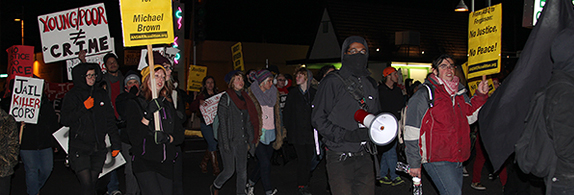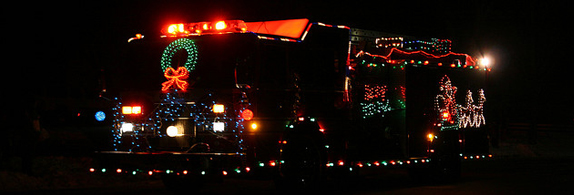Ferguson, Albuquerque, Sanford, Los Angeles, the World

The dignity, imagination, courage and political savvy of more than 300 people marching on Central Avenue near Nob Hill last week makes it clear who values justice in our town. This orderly assembly of people of all ages and ethnicities was stalked by police in riot gear waiting for some action. A blast device was thrown into the crowd. But they could not be provoked to violence.
They were marching in solidarity with the people of Ferguson, protesting the St. Louis County grand jury’s refusal to indict Officer Darren Wilson for murdering 18-year old Michael Brown. And they were there, as well, in heartfelt fellowship with the families that have suffered from police violence.
For many of us the grand jury’s decision was sickening. When we saw that far right commentators were using social media in the crudest of ways to make political hay from the decision, inciting race and class hatred, it verified once again what many of us have surmised for decades.
The conclusions were unavoidable. The moneyed power structure that fuels right wing extremism uses race and class to divide the country for political gain. The grand jury system, as we see it operating across the country, is corrupted by a collusion of prosecutors and police. Citizens are forced by law to sit on grand juries when summoned. Their job is to decide on probable cause for indictments of the accused. Typically, grand juries hear only the prosecution’s side of a case. They rarely, if ever, face defense attorneys or defendants. The system is weighted toward indictment.
Except, of course, when it comes to Darren Wilson, or to any of the Albuquerque police shooters scrubbed clean of crime by the District Attorney and various grand juries. But murder has no statute of limitations and a grand jury’s failure to indict does not create a situation of double jeopardy. Officers could be indicted by other grand juries in the future.
It’s as if grand jurors develop a version of the Stockholm syndrome with the police and prosecutors. They are a “captive” audience. They see little else but police evidence, hear almost nothing but police testimony, and become friendly with the DA’s prosecutorial staff. As with kidnap victims who bond with their tormentors, grand juries can bond and do bond with the police. The stress on jurors is intense. The work load can sometimes block sound decision making. Jurors look to prosecutors for relief because prosecutors run the show. No wonder police who kill “in the line of duty” are virtually never indicted.
The moneyed power elite wants the radical status quo to stay exactly as it is. Republican or Democrat, it doesn’t matter. The court system is rigged. The police serve power. The courts do too. Anyone who’s covered them as a reporter since the l960s know this is true no matter the rhetoric and constitutional sweet talking.
This has always been a tendency in our country. It rises up, as it’s doing now, in times of extreme economic and social crisis and during times of devastating income and, therefore, power inequality. We have exported the idea of militarized police protecting the elitist status quo all over the world, and have wreaked havoc in Latin America and the Middle East.
This is not supposed to be the American way, of course. But equal justice under law has become a hollow phrase. The latest rigging of justice started, I think, in the 1960s and 1970s, with the convergence of the Civil Rights movement, the Anti-war movement, and the many hundreds of cities that exploded in full-fledged riots, including Watts in L.A, Detroit, and Memphis. When the Omnibus Crime Act of l968 began militarizing police and creating more than a hundred National Guard Units devoted to riot control, the seeds of the 1992 Rodney King anti-police riots and other protests against police brutality were sown.
The murder of Trayvon Martin in Sanford, Florida two years ago by a neighborhood vigilante and the 27 people killed by police since 2010 in Albuquerque have all fallen into the hands of a police/prosecutor power structure that does not defend equal justice under law but enforces a shut up, keep still, trudge on society of those horribly burdened by the status quo.
In Albuquerque, this status quo hides terrible brutality wreaked on the homeless, on destitute Native Americans, and on poor women who are murdered and whose killers are never found. The 27 people shot dead here by the police so far since 2010 include Kenneth Ellis III, Jacob Mitschelen, Robert Redwine, Christopher Torres, Alan Gomez, James Boyd, 19-year old Mary Hawks, retired Air Force Colonel Armand Martin and l9 others, the vast majority of them weaponless and psychologically defenseless.
It should not go unnoticed that the same political and economic philosophy that brought us The House UnAmerican Activities Committee (HUAC) and McCarthyism in the 1940s and 50s that attacked and terrified Americans seeking social and economic justice has now found a new voice in obnoxious, stomach-turning far right pundits twittering their hate and bile though the ether of the internet while millions of Americans are in mourning for lost justice in our country.
Pearce and Net Neutrality

The idea of “net neutrality” can seem like a thorny briar full of fog and howling. It’s hard to wrestle with its complications without our brains feeling scratched up. Why would “neutrality” be bad for business as some big companies contend? Why would it be “like Obamacare”?
But when you start reading up on “net neutrality” and thinking it through, you realize it’s not about choking off business competition. It’s about protecting us from corporate censorship. You find that major companies making billions off the internet -- like AT&T, Verizon, Comcast and Telus -- have already tried to censor the internet and were foiled by the spirit of net neutrality. You come to understand that even the ACLU, which supports Big Money in Citizens United and equates dollars with speech, paradoxically sees net neutrality as the cornerstone of open communication on the web.
And then you get down and dirty and realize that it’s New Mexico U.S. Representative Steve Pearce, and the Republican “talking points” brain trust, that calls net neutrality “Obamacare for the Internet,” an unconscionable regulation of an open market.
Proponents for net neutrality do not see it as “regulating” the Internet. They see net neutrality as keeping the Internet open and free as it is, more or less, right now. The kind of Internet that allows the New Mexico Mercury to publish what it wants, how it wants, and when it wants, is dependent on net neutrality.
As New Mexico U.S. Senator Tom Udall has put it, “Net neutrality is about leveling the playing field, and I am encouraged that the president has joined the call for strong rules by the FCC (Federal Communications Commission) to protect the open Internet….New Mexicans have been asking me to ensure the Internet remains an open and fair forum….to continue to be a platform for free expression, to promote innovation, and help online entrepreneurs compete on a level playing field with established companies.”
New Mexico’s junior Senator Martin Heinrich adds that “I have serious concerns about an FCC proposal that includes a “fast lane” that could allow service providers to discriminate against small Internet businesses and weaken consumer protections…As a staunch supporter of net neutrality, I believe the FCC needs to establish strong, enforceable rules that ensure free speech, protect consumers, and preserve competition.”
Using similar language, but with a very different meaning, U.S.Rep Steve Pearce is against net neutrality, declaring that the FCC and the Obama administration “have worked to impose rules that would regulate how broadband providers can sell their products. These actions would undermine the free marketplace and restrict the ability of these business to offer unique and innovative products.”
Here’s how the broadband “free marketplace” might work without net neutrality. AT&T might try to censor political speech like they did in 2007 when they censored the lyrics of the rock band Pearl Jam because they were critical of President George W. Bush. Comcast, the nation’s largest cable company, tried in 2007 to jam up file transfers and sharing through a company called BitTorrent, particularly video sharing, because the FCC determined Comcast was looking to deal in videos itself.
Without net neutrality the free marketplace of the Internet could see giant corporations like Verizon actually censor political speech it deemed damaging to business or its political views. In 2007, Verizon cut off a text messaging program used by NARAL (National Abortion and Reproductive Rights Action League) Pro-Choice America calling its content controversial and unsavory. In 2005 the Canadian telecom company Telus was involved in a labor dispute and blocked its Internet subscribers from viewing the website of the union it was opposing.
This is what the so-called free market on the Internet could mean without enforceable net neutrality regulations. The big sharks eat the little ones and you and I are left with Great Whites jawing us on what we can see and read. The power elite equates not only money, lots of money, with speech but also freedom, itself, with money. The more you have, the more free you are to whack everyone else.
Why We Love New Mexico – Las Vegas Christmas Light Parade

Every first Saturday in December, this year December 6, the town of Las Vegas, New Mexico hosts its annual Christmas Electric Light Parade. The spirit of this celebration always leaves us full of the joy that comes from witnessing such an abundance of kindness and generosity that one’s faith in humanity is restored.
It’s the Santa Claus of Las Vegas that brings magic to that night. Every child in town that needs a present gets one from him.
This is part of the reason that Las Vegas is so much more than the county seat of San Miguel County. It is the heartland of indigenous Hispanic America. It’s population is less than 30,000 people, but it has more buildings on the National Historic Register for its size than almost any other place in the country. Its sense of civic pride and solidarity shines through at Christmas time.
The city’s unofficial motto was put on a coffee mug once: “Las Vegas: The City Indifferent: We Don’t Give A Damn Who You Are.” That speaks to its independence, but not to its welcoming and cosmopolitan spirit, with its extraordinarily helpful librarians at the Carnegie Library, its students and professors at New Mexico Highlands University, it’s a down home courtly and welcoming cheer. And if you’re a child at Christmas, Las Vegas is anything but indifferent.
The Christmas Electric Light Parade attracts what feels like almost every family in town. Crowds line the streets from downtown to the plaza, a mile or more.
It can get very cold, even when the parade starts at 6:00 pm. The town is dark, as if the street lights have been dimmed. Boozing is not in evidence. It’s among the safest public events I’ve experienced, the mood is so mellow.
And then after a long wait and some biscochitos and tamales from El Realto down Bridge Street, the first lights are seen and bands are heard. The bands can include the Fighting Pintos from Moriarty, and one from West Las Vegas Middle School. All have flash and style. Cheerleaders are cold but valiant. Sometimes the brass section can’t play because it’s so cold their lips could stick to their instruments.
And then the first floats appear, all lit up and glowing – fire truck towing a Creche with a beaming, but shivering, Mary and Joseph, an emergency vehicle festooned with lights, and one year I believe a very spiffy garbage truck made the lineup complete with lights and a message of good cheer from the city’s solid waste department. And so it goes with honking horns and everyone shouting Feliz Navidad and Merry Christmas.
And then at the end of the parade, in resplendent sleigh with so many lights and elves you could see it from the space station, the Las Vegas Santa appears, blowing kisses to the assembled, hugging kids and moms and dads, moving around the plaza to the dark side of the street.
And then the real joy takes over. Santa emerges from the shadows and occupies his chair on the gazebo in the plaza with bags and piles and boxes of presents all around him. Rumor has it that Santa buys them himself, raising money for them all year long. And the children and their parents line up in the cold. The line can be very long but no one leaves until the very end. And every child who approaches Santa, swaying sheepishly or momentarily in tears, gets a carefully selected gift, and maybe two if Santa senses a little extra need. And most remember to say thank you. All are enchanted. It’s the way it’s supposed to be—being surprised and delighted by the way world is—right at that very moment. A guileless glee, a sweet home feeling that all is well and could be again and again.
In Las Vegas, during those early December nights, the spirit of the season is real. Once you’ve been there, you can return anytime you need to if days get bleak. What a gift it is.
(Photos: Open graphic by opensource.com / CC; Decorated firetruck by davef3138 / CC)




Responses to “Provincial Matters, 12-1-2014”